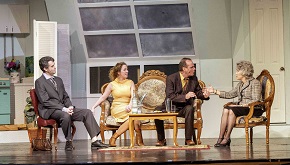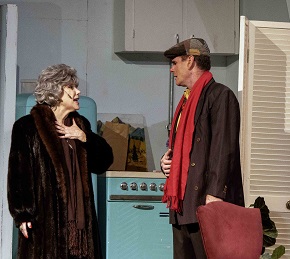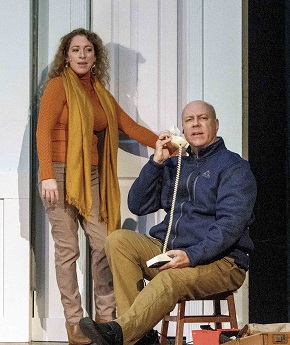
Stephen Keenan, Sara Grant, Christopher Dreeson and Francine Burns in PPTOPA’s Barefoot in the Park. Photo by Ron Pollock
By Mariah Reed
Neil Simon’s longest-running hit, Barefoot in the Park opened at the Biltmore Theatre on Broadway on October 23, 1963. It was only the second play Simon had ever written, yet it was nominated for four Tony Awards, winning Best Direction of a Play in 1964. One might ask if a play written in 1963 still resonates with modern audiences. The crowd at the Pembroke Pines Theatre of Performing Arts (PPTOPA) dispels all doubts as they enthusiastically gasped and guffawed throughout the performance on the afternoon this reviewer attended the show.
The play begins as newlyweds Paul and Corie Bratter return from a luxurious six-day honeymoon at the Plaza Hotel to their new, cramped, living quarters: a chilly fifth-floor walkup in Manhattan. Free-spirited Corie embraces novel experiences, but new hubby Paul prefers to focus on the very real, and, in his view, impractical, aspects of their new home.
Prancing about the apartment, Sara Grant’s Corie barely notices the hole in the skylight and the cold-as-ice radiator. But Stephen Keenan’s Paul sputters in frustration at the exhaustive climb to the premises, the tiny bedroom, and the miniscule bathroom lacking a tub. He is equally concerned about the strange neighbors in the building, especially the infamous Victor Velasco, a mountain-climbing gourmet chef, interior designer and suspected womanizer who lives in the attic.

Francine Burns and Stephen Keenan in PPTOPA’s Barefoot in the Park. Photo by Ron Pollock
When Corie’s elegantly dressed mother, Ethel Banks, comes to visit, she feigns approval of the new digs for Corie’s sake. After Ethel leaves, Corie is shocked to discover a flamboyantly eccentric stranger barging into her apartment.
The man is the mysterious Victor Velasco, who explains that since the landlord has locked him out due to nonpayment of rent, he must now gain access to his attic apartment by climbing out of Corie’s bedroom window and scaling a narrow ledge outside of the building. Drawn to his charm and adventurous spirit, Corie resolves to set him up with her mother on a surprise blind date.
Lawyer Paul is increasingly focused on his latest court case. However, Corie presses him and eventually he begrudgingly agrees to join her on the arranged double date, which features exotic food and lots of alcohol.
After the date Ethel and Paul are miserable, but Victor and Corie are revitalized from the experience. When Victor offers to get Ethel home safely, she reluctantly accepts. Later, Paul lambasts Corie for her insensitivity towards her mother while Corie insists that he is simply incapable of enjoying himself. Tempers flare, with Corie livid that earlier that week Paul refused to walk barefoot in the park with her in seventeen-degree weather. Paul dismisses her concerns as unreasonable and Corie demands a divorce.
The next morning anxious Aunt Harriet calls to informs Corie that Ethel is missing. Corie suspects nefarious behavior on the part of the slick Mr. Velasco and regrets she chastised Paul for cautioning her about the man.
When she finds her mother in Velasco’s apartment, Corie is shocked and for once words escape her. Ethel convinces Corie all is well and urges her to consider compromise as an important element in a successful marriage. When Paul arrives frozen, wet, and feverish, he confesses that he walked barefoot in the park to prove his love to Corie. The couple embrace and concede that love requires sacrifice.

Sara Grant and Greg Schuh in PPTOPA’s Barefoot in the Park. Photo by Ron Pollock
Barefoot in the Park addresses what happens in a relationship after the heady glow of new love fades and couples discover their differences. In this production, director Seth Trucks has chosen to depict Corie as a young woman teetering between childlike and childish behavior.
Corie and Paul engage in petulant bickering rather than navigate conflict resulting from sincere clashes in mindset. When Corie asks for a divorce, it feels like a drunken, meandering, accidental threat rather than the result of a growing awareness that their differences are concerning. Even so, there is chemistry between the two characters, and it may well be that their differences are what brought them together in the first place.
Greg Schuh as TV Repairman provides hilarious, yet tenderly empathetic suggestions that diffuse tension and provide a much-needed pause in the combative atmosphere established by our sparring newlyweds. Jose Norono makes a brief but effective appearance as an exhausted delivery man, reinforcing the idea that the apartment is difficult to access.
Francine Burns as Mrs. Banks is a delight with her deft comic timing and just-right balance of motherly concern and middle-aged angst as she navigates her new role in life as a single empty nester. She masters moments of physical comedy whether it be secretly and strategically tossing a foul piece of food or trying to open a door with hands that are somehow frozen flat by alcohol.
Christopher Dreeson is equally convincing as charming and mysterious neighbor Victor Velasco with his neatly slicked back hair, dashing ascot and confident swagger. He elicited some of the audience’s biggest laughs with on-point delivery of punchlines delivered with a consistently exotic, yet comically vague, accent.
John Blessed’s set is a study in practical simplicity. Eclectic furnishings are minimal, yet cozy, and the miniscule kitchen is charming and period appropriate. Lisa McFadden-Murphy’s props were mostly suitable to the period while Alicia Rivera’s costumes were charmingly evocative of the 1960’s. Scene-change music reinforced thematic elements of the play and whisked us back to the innocence of an earlier time.
PPTOPA’s Barefoot in the Park reminds us that navigating our differences has the potential to bring us closer to one another if we can appreciate and respect the other’s perspective. A timeless and worthy message indeed.
Pembroke Pines Theatre of the Performing Arts’ production of Barefoot in the Park runs through Jan. 28 at the Susan B. Katz Theater of the Performing Arts at the River of Grass ArtsPark, 17195 Sheridan St. in Pembroke Pines. Running time is two hours with a 15-minute intermission. Performances are Fridays at 8 p.m.; Saturdays at 2 and 8 p.m.; Sundays at 2 p.m. Tickets are $35 for adults; $25 for students and seniors 62 years and older. Visit pptopa.com or call 954-890-1868. Accessible parking is available, and the venue offers wheelchair accessible seating.









 A PaperStreet Web Design
A PaperStreet Web Design
